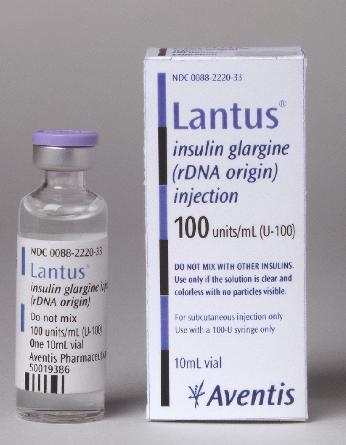
Amylin Pharmaceuticals, Inc. (Nasdaq: AMLN) and Eli Lilly and Company (NYSE: LLY) announced results from the first double-blind, placebo-controlled clinical study to evaluate BYETTA(R) (exenatide) injection added to Lantus(R) (insulin glargine), which showed patients with type 2 diabetes achieved glucose targets without weight gain or increasing their risk of hypoglycemia. These findings were presented at the 70th Annual Scientific Sessions of the American Diabetes Association (ADA) in Orlando, Fla.
In the study, patients receiving insulin glargine, with or without oral agents, were randomized to receive BYETTA or placebo in addition to aggressive insulin titration. After 30 weeks of treatment, A1C decreased by 1.7 percentage points in patients adding BYETTA, compared with a decrease of 1.0 percentage point in patients treated with insulin alone. Weight decreased in patients adding BYETTA by 4 pounds, compared with an increase of 2 pounds in patients treated with insulin alone. Fasting plasma glucose and hypoglycemia were similar between treatment groups.
"Even in this population of patients who were poorly controlled on insulin therapy, the addition of BYETTA to optimized basal insulin therapy provided exactly what we hoped for - improved control of blood sugar throughout the day, weight loss and no increased risk of hypoglycemia as compared to optimized basal insulin treatment alone," said John Buse, M.D., Ph.D., Professor of Medicine, Director of the Diabetes Care Center, and Chief of the Division of Endocrinology at the University of North Carolina School of Medicine in Chapel Hill. "This study showed BYETTA may provide a complementary addition to basal insulin for these hard-to-treat type 2 diabetes patients."
Results from this study will form the basis for a supplemental New Drug Application (sNDA) to the U.S. Food and Drug Administration (FDA). The filing is planned for the end of 2010.
 Was Added to Lantus(R).jpg)
Study Design and Findings
The double-blind, placebo-controlled study enrolled 261 patients (mean age: 59 years old; weight: 208 pounds; A1C: 8.4 percent; diabetes duration: 12 years; insulin dose 48 units) who were randomized to BYETTA 10 micrograms (n=137) or placebo (n=122). Groups were generally comparable at baseline. Insulin dose was decreased by 20 percent if a patient's A1C was < 8 percent or maintained if a patient's A1C was > 8 percent for five weeks, then titrated to achieve a target fasting glucose of < 100 mg/dL. Primary endpoint was change in A1C, a measure of average blood sugar over three months. Continuous glucose monitoring (n=23) and 7-point glucose profiles demonstrated significant postprandial effects with BYETTA compared with insulin alone. Insulin dose increased more in the placebo group (20+2 units) than in the BYETTA group (13+2 units) to achieve the fasting glucose target.
Safety Profile
Nausea was the most common event during the 30-week treatment period and decreased over time. Nausea occurred in 41 percent of patients treated with BYETTA compared with 8 percent of patients treated with insulin alone. Hypoglycemia was similar for both groups; major hypoglycemia occurred twice in one patient receiving insulin alone.
About Diabetes
Diabetes affects more than 24 million people in the U.S. and an estimated 285 million adults worldwide.(i,ii) Approximately 90-95 percent of those affected have type 2 diabetes. Diabetes is the fifth leading cause of death by disease in the U.S. and costs approximately $174 billion per year in direct and indirect medical expenses.(iii)
According to the Centers for Disease Control and Prevention's National Health and Nutrition Examination Survey, approximately 60 percent of people with diabetes do not achieve their target blood sugar levels with their current treatment regimen.(iv)In addition, 85 percent of type 2 diabetes patients are overweight and 55 percent are considered obese.(v) Data indicate that weight loss (even a modest amount) supports patients in their efforts to achieve and sustain glycemic control.(vi,vii)
About BYETTA(R) (exenatide) injection
BYETTA is the first FDA-approved GLP-1 receptor agonist for the treatment of type 2 diabetes. BYETTA exhibits many of the same effects as the human incretin hormone glucagon-like peptide-1 (GLP-1). GLP-1 improves blood sugar after food intake through multiple effects that work in concert on the stomach, liver, pancreas and brain.
BYETTA is an injectable prescription medicine that may improve blood sugar (glucose) control in adults with type 2 diabetes mellitus, when used with a diet and exercise program. BYETTA is not insulin and should not be taken instead of insulin. BYETTA is not recommended to be taken with insulin. BYETTA is not for people with type 1 diabetes or people with diabetic ketoacidosis.
BYETTA provides sustained A1C control and low incidence of hypoglycemia when used alone or in combination with metformin or a thiazolidinedione, with potential weight loss. BYETTA is not a weight-loss product. BYETTA was approved in April 2005 and has been used by more than one million patients since its introduction. See important safety information below. Additional information about BYETTA is available at www.BYETTA.com.

